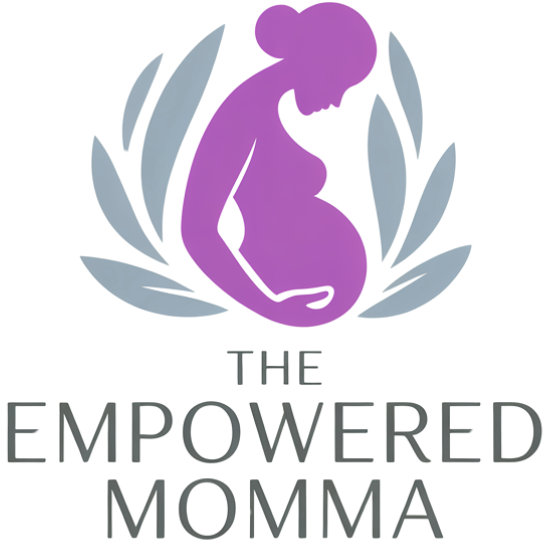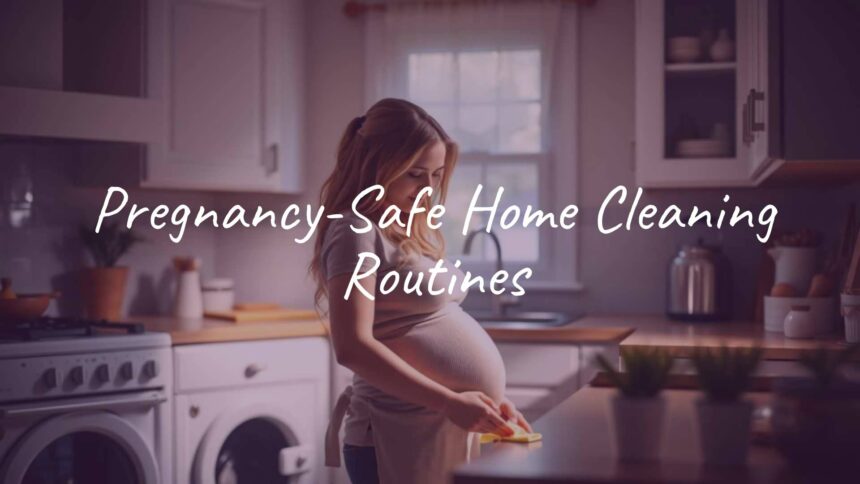During pregnancy, your body and daily life change a lot. Keeping your home clean is important for both your health and your baby’s, but you may need to make some changes to how you clean to avoid unnecessary risks from regular cleaning products and hard physical work. Fortunately, with a few adjustments, cleaning while pregnant is generally safe. This guide gives you clear tips for keeping your home tidy and safe, points out products to avoid, and explains which chores you may need help with.
What Makes a Home Cleaning Routine Pregnancy-Safe?
A pregnancy-safe cleaning routine focuses on the well-being of both you and your baby. This means knowing which chemicals and activities could be harmful and making safer choices. Choose safer cleaning products, keep rooms aired out, and avoid pushing yourself physically, especially as your pregnancy progresses.
Main Dangers of Usual Cleaning Products During Pregnancy
Many regular cleaning products have strong chemicals. While they clean well, some ingredients can be risky during pregnancy. The dangers come from breathing in or getting these chemicals on your skin. For example:
- Glycol ethers: Found in oven cleaners. Can cause miscarriage, lower fertility, and birth defects. Watch for names like 2-butoxyethanol (EGBE) and methoxydiglycol (DEGME) on the label.
- Phthalates: Often listed as “fragrance” in products. Exposure can cause male reproductive problems in babies.
- Alcohol, ammonia, chlorine, and sodium hydroxide: Used in sprays, air fresheners, and other cleaners. Linked to asthma or breathing problems in babies exposed before birth.
Why Safe Cleaning Choices Matter in Pregnancy
Your body supports your growing baby, and what you breathe in-and touch-can affect their development. Some chemicals from regular cleaning products have been found in babies’ cord blood, and ongoing research connects these with health or learning issues in kids. By making safer cleaning choices, you lower possible risks for your child. Since many cleaning products are not strictly controlled, taking charge of what you use is a smart step.

Which Cleaning Products Are Safe to Use While Pregnant?
The idea of a totally chemical-free home can feel overwhelming, but many products can clean well without putting you or your baby at risk. The most important thing is reading labels and understanding what’s inside the bottle or spray can.
What Ingredients to Choose and Which to Avoid
| Ingredients to Avoid | Safer Options |
|---|---|
|
|
Always keep the room well-ventilated when you clean. If unsure about a product, the Environmental Working Group (EWG) website rates products by how safe their ingredients are. Pick those with “A” or “B” scores.
Natural and DIY Cleaning Options
If you want to avoid chemicals as much as possible, try simple homemade cleaners:
- Baking soda: Good for scrubbing and removing smells.
- White vinegar and water: Cleans glass, surfaces, and disinfects when diluted.
- Lemon juice: Cuts grease and leaves a fresh scent.
- Castile soap: Gentle, plant-based soap for dishes and floors.
- Essential oils (like tea tree or lavender): Can help clean, but check if they’re safe in pregnancy.
Making your own cleaners can also reduce plastic waste and keep harsh chemicals out of your home and the environment.

Tips to Lower Exposure to Harmful Chemicals While Cleaning
Even safer products can sometimes irritate your skin or airways. Adopting safe cleaning habits can make your home even healthier.
Get Fresh Air In
Keep windows and doors open while you clean to get rid of fumes and help odors go away quickly. Use fans if windows are not available. This makes it less likely that you or your baby will breathe in anything bothersome.
Wear Protection
- Wear gloves when cleaning so nothing touches your hands directly.
- Use a mask and safety glasses if there are fumes or sprays, or if you’re cleaning with stronger products.
Even natural homemade cleaners might dry out your skin, so gloves are helpful either way.
Pick Non-Toxic and Fragrance-Free Products
Labels that say “fragrance” could mean hidden harmful chemicals. Look for “fragrance-free” and “non-toxic” products. If buying green or eco-friendly cleaners, check for third-party certifications like “Green Seal” or “EcoLogo.” If the smell of a cleaner is too strong, skip it during pregnancy.
Which Household Chores Should You Avoid During Pregnancy?
Most light cleaning is okay, but some tasks have higher chances of causing harm. If possible, let someone else handle these jobs, or make them safer by changing how they’re done.
Lifting and Carrying Heavy Things
Your joints and muscles loosen and shift during pregnancy, making heavy lifting riskier for your back and belly. Don’t move furniture, big loads of laundry, or anything heavy. If you must lift something, use your legs-not your back-and keep the item close. If it feels too heavy, ask for help.
Dealing with Cat Litter and Pet Messes
Cleaning a cat’s litter box can expose you to a parasite (Toxoplasma gondii) that’s dangerous for unborn babies. Let someone else handle this chore. If you have to do it yourself, wear gloves and a mask, and wash your hands well right after. Try to keep cats indoors and feed them cooked or dry food only.

Standing Too Long and Overreaching
Long periods of standing or reaching overhead can lead to aches and make you unstable, especially later in pregnancy. Sit as much as possible and use tools with long handles to clean spots up high or down low. Take lots of breaks to rest your back and feet.
Bending, Climbing, and Balancing
Bending over, kneeling, or climbing ladders becomes more dangerous as your belly grows. Avoid cleaning spots that force you to balance or stretch. Wait for someone else to help with high places, windows, or anything requiring a ladder.
How to Set Up a Pregnancy-Safe Cleaning Routine
Making your cleaning routine safer is about being smart with your energy and knowing when to get help. Don’t do more than you need to, and focus on the basics.
Cleaning Priorities
Focus on areas where germs tend to build up, like the kitchen and bathroom. Wipe down surfaces, dust, and mop floors with gentle cleaners. Take out trash often. In the nursery, clean the crib and changing table regularly but use safe products.
Setting Schedules and Keeping Tasks Manageable
Break up your cleaning into small steps-don’t try to clean the whole house at once. Spread chores out through the week, listening to your body and taking breaks as needed. “Good enough” is fine. In the last months of pregnancy, you may need to scale back further, and that’s okay.
Ask for Help When Needed
Let your partner, family, or friends tackle jobs that are too hard or unsafe, such as litter boxes, moving furniture, or climbing. Even small chores like laundry can add up. If it’s an option for you, hiring a cleaning service (even just once or twice) can take a big load off your shoulders and keep your home safe and tidy.
Adjust Your Cleaning by Trimester
Your cleaning ability and comfort level will change over the months. Adjust as your pregnancy continues:
| Trimester | What to Watch For | Helpful Tips |
|---|---|---|
| First | Tiredness and nausea are common | Keep tasks light, avoid strong smells, rest often, switch to natural products |
| Second | More energy, but growing belly shifts balance | Avoid lifting/bending, space out chores, use long-handled tools |
| Third | Movement may be hard and fatigue may return | Stick to light chores, avoid all heavy, high, or low tasks, ask for more help |
Getting a Nursery Ready-The Pregnancy-Safe Way
Setting up a baby’s room is exciting, but do it in a way that keeps both you and the baby safe from the start.
Cleaning to Reduce Allergens
- Air out the room well before cleaning.
- Dust furniture, shelves, and toys using a damp cloth.
- Mop or vacuum floors using non-toxic solutions.
- Wash all bedding, sheets, and clothes with fragrance-free detergent.
- Use furniture and baby products made from natural materials if possible. Avoid products with added chemicals or non-stick coatings.

Safe Surface Cleaning and Disinfecting
- Clean changing tables and hard toys with safe disinfectants or diluted soap solutions.
- Wash soft toys in the washing machine.
- If painting, use paints marked “low-VOC” and let the room air out fully before using it.
- Stay out of the room while fresh paint is drying, and only use the nursery when fumes are gone.
- Store food and breast milk in glass, not plastic, to avoid chemical leaching.
Frequently Asked Questions: Pregnancy-Safe Home Cleaning
Can Pregnant Women Use Disinfectant Sprays and Wipes?
You can normally use most disinfectants, but sprays can make chemicals easier to inhale, which might increase asthma risk for the baby. If you use sprays, open windows, wear a mask and gloves, and spray cleaner onto a cloth-not into the air. It’s safest to skip sprays and air fresheners during pregnancy.
Is Hiring a Cleaning Service Safe During Pregnancy?
Hiring cleaners is a good choice if you’re tired or unable to do bigger jobs. Professional cleaners can handle tough chores that would expose you to more chemicals, allergens, or hard work. Whether it’s a deep clean or just regular cleaning, this can help you focus on your health and prepare for the baby without extra stress.
Are Essential Oils Okay in Pregnancy Cleaning?
Some essential oils (like tea tree or lavender) fight germs, but not all are safe for pregnancy. Always research or ask your doctor before using any essential oil when you’re expecting. If you decide to use them, make sure the oils are diluted, well-ventilated, and don’t come into contact with your skin. For air-freshening, essential oils may be safer than scented sprays, but it’s still best to check with a healthcare professional.

